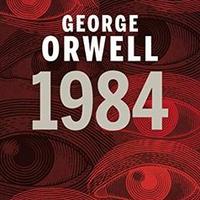Part three, Chapter 1 (3)
Give me a chance and I'll tell you every word of it. HE'S the one that's against the Party, not me.' The guards stepped forward. The man's voice rose to a shriek. ‘You didn't hear him!' he repeated. ‘Something went wrong with the telescreen. HE'S the one you want. Take him, not me!'
The two sturdy guards had stooped to take him by the arms. But just at this moment he flung himself across the floor of the cell and grabbed one of the iron legs that supported the bench. He had set up a wordless howling, like an animal. The guards took hold of him to wrench him loose, but he clung on with astonishing strength. For perhaps twenty seconds they were hauling at him. The prisoners sat quiet, their hands crossed on their knees, looking straight in front of them. The howling stopped; the man had no breath left for anything except hanging on. Then there was a different kind of cry. A kick from a guard's boot had broken the fingers of one of his hands. They dragged him to his feet.
‘Room 1o1,' said the officer.
The man was led out, walking unsteadily, with head sunken, nursing his crushed hand, all the fight had gone out of him.
A long time passed. If it had been midnight when the skull- faced man was taken away, it was morning: if morning, it was afternoon. Winston was alone, and had been alone for hours. The pain of sitting on the narrow bench was such that often he got up and walked about, unreproved by the telescreen. The piece of bread still lay where the chinless man had dropped it. At the beginning it needed a hard effort not to look at it, but presently hunger gave way to thirst. His mouth was sticky and evil-tasting. The humming sound and the unvarying white light induced a sort of faintness, an empty feeling inside his head. He would get up because the ache in his bones was no longer bearable, and then would sit down again almost at once because he was too dizzy to make sure of staying on his feet. Whenever his physical sensations were a little under control the terror returned. Sometimes with a fading hope he thought of O'Brien and the razor blade. It was thinkable that the razor blade might arrive concealed in his food, if he were ever fed. More dimly he thought of Julia. Somewhere or other she was suffering perhaps far worse than he. She might be screaming with pain at this moment. He thought: ‘If I could save Julia by doubling my own pain, would I do it? Yes, I would.' But that was merely an intellectual decision, taken because he knew that he ought to take it. He did not feel it. In this place you could not feel anything, except pain and foreknowledge of pain. Besides, was it possible, when you were actually suffering it, to wish for any reason that your own pain should increase? But that question was not answerable yet.
The boots were approaching again. The door opened. O'Brien came in.
Winston started to his feet. The shock of the sight had driven all caution out of him. For the first time in many years he forgot the presence of the telescreen.
‘They've got you too!' he cried.
‘They got me a long time ago,' said O'Brien with a mild, almost regretful irony. He stepped aside. From behind him there emerged a broad-chested guard with a long black truncheon in his hand.
‘You know this, Winston,' said O'Brien. ‘Don't deceive yourself. You did know it — you have always known it.'
Yes, he saw now, he had always known it. But there was no time to think of that. All he had eyes for was the truncheon in the guard's hand. It might fall anywhere; on the crown, on the tip of the ear, on the upper arm, on the elbow ——
The elbow! He had slumped to his knees, almost paralysed, clasping the stricken elbow with his other hand. Everything had exploded into yellow light. Inconceivable, inconceivable that one blow could cause such pain! The light cleared and he could see the other two looking down at him. The guard was laughing at his contortions. One question at any rate was answered. Never, for any reason on earth, could you wish for an increase of pain. Of pain you could wish only one thing: that it should stop. Nothing in the world was so bad as physical pain. In the face of pain there are no heroes, no heroes, he thought over and over as he writhed on the floor, clutching uselessly at his disabled left arm.

